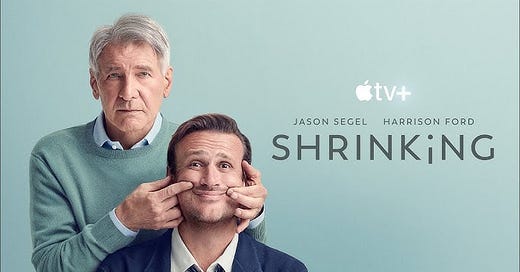EPISODE 947: RESOLUTIONS
How a Show about Wacky/Damaged Pasadena Shrinks Lights a Hopeful Path into 2025
As soon as I finished the season two finale of the Apple+ TV show Shrinking last week I started the whole series over. That’s not something I normally do—though if anyone’s shows deserve an immediate second look they’re those produced by Bill Lawrence (Scrubs, Cougar Town, Ted Lasso, and many others).
And while Shrinking was co-created by writer/actors Jason Segel and Brett Goldstein, in many ways it also feels like a distillation of Lawrence’s work. Segel’s Jimmy is a latter-day J.D., the doctor wanting to do good things and yet also having to deal with how fucked up he is, just like his Black friend (and in this case initially patient) Sean.
The community around them also has so much in common with the Cougar Town crew’s vibe. In my head canon they exist in the same universe, and Ellie and Liz are twin sisters.
But the overarching idea of trauma that unites Jimmy and his friends is very much of a piece with Ted Lasso, as is the yearning to move through it by way of friendship and a quiet, self-effacing courage. And as I’ve rewatched the series I’ve realized it’s that subject matter more than anything that makes me feel so connected to it. I know what it is to bury pain and confusion beneath work or blame, to think I’ve moved through it when I absolutely have not, and to have to find my way back to the vault where I put my feelings and try to crack the safe I left them in.
(Watching Shrinking, I realize that Pandora’s Box is a parable about what happens when a person or society closets themselves. To quote Harrison Ford’s character Paul: “Boom.”)
And even as some of the characters on Shrinking have been through extremely difficult situations, the show affords everyone their own thing they’re working through. The show understands trauma as something simultaneously infinitely personal in the specifics and yet also a shared element of life. While no one can understand what Jimmy went through when he lost his wife, or Sean when he was stationed overseas, etc. etc., they’ve all been through something of their own, just like us.
And that allows them to be able to call each bullshit on one another, too. In some ways my biggest takeaway from the show is the need to surround yourself with people who can listen and also pop a hole in your drama when you’ve lost the plot and get you back to a place of laughter and truth.
But the thing I’m most noticing as I go back through the series is the opening credits. Designer James Robertson and his team had also done the opening titles for Ted Lasso. Where Lasso’s credits focus on Ted and how his presence changes everything around him, Shrinking presents a whole range of characters trying to find their way through a maze. The titles begin with a flag and the lyric “Help me carry this weight that’s dragging me down,” and we cut to someone following the person holding the flag in the maze—an apt metaphor for therapy.
But instead of continuing to follow the therapist, after that initial image we cut to a group of people who together decide to climb over part of the maze. Then we get some walking together while one runs off alone; a person trying to dig their way underneath; someone trying to help someone else stand up. And finally we pull back to the maze as a whole and discover so many different people each making their own way through.
I love how the credits refuse to give a psychologist figure some kind of special wisdom or power in the story. In the end following the person with the flag is just one way to get through the maze, and that person just another character trying to find their way through.
I also love how when we get to see the big picture, the variety of approaches, which includes someone walking on massive stilts and someone who has had the wonderful idea of flying over the maze in a red balloon, gives that whole quest a great playfulness and joy. That’s not at all the way therapy is generally imagined, but it is very much how the show conceives of it and all of us, at one and the same time foolish—how is that balloon person ever going to come down?—and delightful.
I keep going back to that one moment, too, where what looks to be an older man like Paul is offering a hand to someone who has fallen and popped open their briefcase. Whether we read it as another image of therapy or just an encounter between two more people in the maze, I think what makes it so arresting is its essential kindness. It cuts right to the essence of what it is to be in the world, and it’s so damn beautiful.
2025 looks to be a pretty challenging year for a lot of people. I’ve definitely put in my time being depressed about some of it. But Shrinking is proving to be a great anti-depressant. It reminds me of how much life and freedom and truth is to be found in our found families, and in doing something as simple as holding out a hand.
If you’re looking for a New Year’s resolution and haven’t yet watched Shrinking, I highly recommend it.
I’ve got one more week in Australia. I’ll be back with more about my adventures here, including my first experience of cricket (which it turns out has nothing to do with insects) and an interview with a truly inspiring lady, in the week to come.






Love this take on the show, and the hope it brings, Jim! Enjoy your last week in Australia and safe trip home!❤️
Thank you!